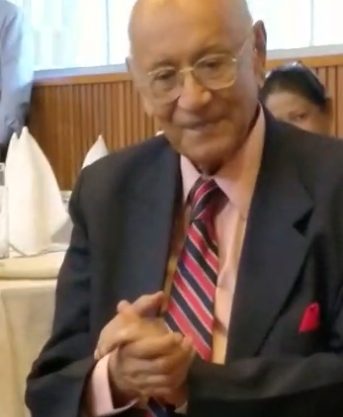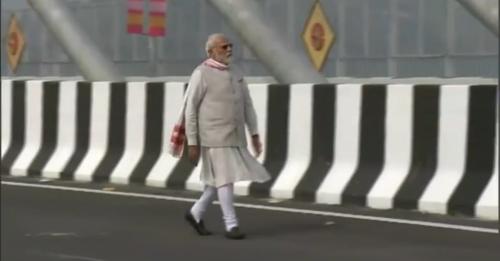BY VISHNU MAKHIJANI New Delhi, Sep 17 (IANS) He's a Gujarati Jain, a strict vegetarian since birth and the only child of his parents. He refused to join the family jewelry business in Surat and London and "stubbornly embraced news broadcasting because it brought in name and glamour although it deprived me of the mercenary benefits of an established business". Sushil Javeri is counted among the finest broadcasters India has produced and at 89, the spark burns as bright as ever in him as he contends that if Amitabh Bachchan can record voice-overs (VOs) in Hindi, so can he in English. Javeri, however, rues that the opportunities are non-existent in Ahmedabad, where he is settled. "A dwarf that I am, incomparable with the giant Amitabh Bachchan, please consider the principle that if his baritone voice is used for Hindi voice-overs & films, why can't my baritone be used for English voice-overs," he asked during a WhatApp interview with IANS. "Big B's baritone VO is used in Hindi, in Bombay, because he is indisputably the best as an ambassador in Hindi. In Ahmedabad, there are no branded products being flaunted in English. "I flatter myself that my diction and delivery in English in a baritone voice is no worse than Amitabh's in Hindi. Then why can't the Ahmedabad film producers use my baritone in English? Why is there a stigma on a baritone in English in Ahmedabad when all the desired qualities of an English commentary do exist," maintained Javeri, who rubbed shoulders at All India Radio (AIR) with the likes of Melville deMellow, Surajit Sen and Vijay Daniels, amongst others. "I have compared Amitabh's Hindi VO in commercial ads in his baritone voice and mine, in the same principle, because short film makers here want only young voices but not baritones like mine, although as crystal clear as Amitabh's. It does not matter if the two languages are different, one Hindi and the other English. Does the English baritone voice suffer from clarity, style of delivery, modulation, correct pauses, correct emphasis, correct increase and decrease of the voice pitch and the best British accent compared with the giant's best Hindi accent? His age and my age are immaterial. If the giant's baritone is good enough, so is mine," Javeri contended. How did it all begin? After his early schooling at Craig School at Ealing in London - where Charlie Chaplin once studied - he returned to India "with a proud British accent". "English held a fascination for me. During my university days in Bombay, Melville de Mellow's news broadcasts from AIR, Delhi inspired me. I took to broadcasting the news in English with the mastery of the language which I had acquired. It brought glamour. I was with AIR for 37 years, one year in Bombay as an announcer of Western music and 36 years in Delhi broadcasting the news," Javeri said. What would his advice be to today's aspiring broadcasters? "A good broadcaster needs three assets: (a) an excellent accent of the language in which he communicates, (b) an excellent style of delivery of speech and (c) voice quality. "Let's discuss a, b, and c: (a) Record and play back the best film actors and imitate them and many more good ones. Learn, retain and reproduce their fabulous accent. In Hindi, Amitabh Bachchan is one. (b) Acquire an excellent style of delivery as in (a). For this, modulate your voice. You can emphasise a word to give importance; give a half second pause before a word to give it importance in another way; increase or decrease the pitch, that is the volume, of your voice where needed. (c) Your voice is given by nature. Make it resonant by reading a 10 minute script ALOUD every day. Do deep breathing for five minutes in the studio before the broadcast," Javeri explained. What have been the highs and lows of his life? "In a span of two or three years from 1988, I corrected two of the Oxford Dictionaries; four corrections totally, if both are put together. I have their replies. This encouraged my self-esteem. "In 1990, I got impleaded in a legal battle with my employer, the Directorate General of AIR, in the Supreme Court. As artistes, we performers were on a five-year contract basis, but the DG, in his shallow wisdom, pleaded for converting us into government servants. I was an artiste for 37 years on renewable contracts. "I won. The Supreme Court ordered the DG to give each artiste an option to maintain his status quo or to convert. My five-year contracts give me all the benefits of a corresponding government servant, plus more," Javeri said. How does he keep himself occupied these days? "I keep myself occupied training men with the best British accent, using it in daily conversation, and in scripts for commercial ads, documentary and corporate films with their different professional styles of delivery in each case. "I teach students individually to learn the best of the best of the British accent, it's standard of proficiency dwindling and so bloody rare in England if the august BBC is anything to go by! "My training consists of learning the British phonetic sounds, ie, the aspirated consonants, the vowels and the stress pattern. Next is to learn how to use these sounds in our daily conversation, in voice-overs for commercial ads, for documentary and corporate films, with different male styles of delivery. The entire course, from beginning to end, is recorded on the student's mobile as his lifelong property," Javeri concluded.
If Amitabh can do Hindi VOs, why can't I do so in English: Sushil Javeri
- by Rinku
- September 17, 2019 2 minutes

Sushil Javeri.











